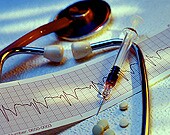November 12, 2014


Latest Heart News
MONDAY, Nov. 10, 2014 (HealthDay News) — Heart attack survivors who receive prompt treatment to unclog blocked arteries and keep them open have a lower long-term risk of dying from heart disease, a new study finds.
However, they still have an increased risk of death from noncardiac causes, such as cancer and lung problems.
The study included more than 2,800 heart attack patients in Denmark who were treated quickly with angioplasty to clear arteries and stents to keep them open on a procedure known as percutaneous coronary intervention (PCI), and then followed for a median of almost five years.
The rate of heart-related deaths among the patients was high in the first month after treatment, but then fell to less than 1.5 percent a year, the study found.
After the first month, nearly 65 percent of deaths among the patients were due to noncardiac causes such as cancer and lung conditions, according to the study published online Nov. 10 in the Journal of the American College of Cardiology.
“The very low long-term cardiac death rate might be explained to some extent by secondary prevention programs. How non-cardiovascular death is influenced by cardiovascular disease needs further study. Our findings encourage continued concentration of resources in prevention, and particularly the treatment of patients in the early phases of a heart attack,” study author Dr. Frants Pedersen, from the University of Copenhagen, said in a journal news release.
“Medical professionals should not only look at the factors that put the patient at risk for a heart attack, but also work to prevent noncardiac diseases on top of the secondary prevention towards cardiac events after a PCI,” Pederson added.
The findings show that doctors need to watch for and treat both cardiac and noncardiac factors that could threaten heart attack survivors’ lives in the long-term, Dr. Mark Hlatky, Stanford University School of Medicine, wrote in an accompanying editorial.
— Robert Preidt
 Copyright © 2014 HealthDay. All rights reserved.
Copyright © 2014 HealthDay. All rights reserved.
SOURCE: Journal of the American College of Cardiology, news release, Nov. 10, 2014
![]()